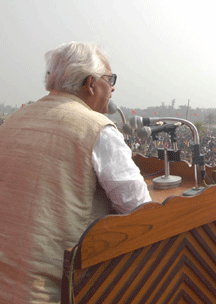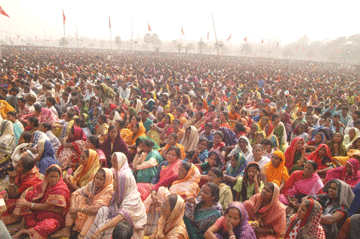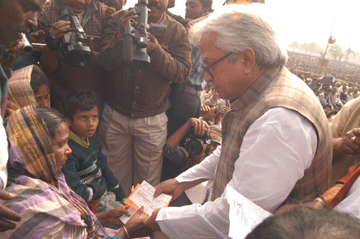 People's Democracy
People's Democracy
(Weekly
Organ of the Communist Party of India (Marxist)
No. 52
December 30, 2007
(Weekly
Organ of the Communist Party of India (Marxist)
|
Vol.
XXXI
No. 52 December 30, 2007 |
‘PEACE, DEVELOPMENT, UNITY OF THE PEOPLE’
B Prasant


Buddhadeb addressing the mammoth gathering at Nandigram
They streamed in, brightfaced and cheerful, emanating glad tidings all the way, and holding high the Red Flag aflutter, from all locales, region, and expanses of Nandigram. Familiar names all – Satengabari, Gokulnagar, Garchakraberia, Sonachura, Ranichak, and Khejuri – from beyond the Talapati channel, from across the Chuni-buri canal and from the outer shores the river Haldi.
They came in their thousands, workers, kisans, small traders, students, boys, and girls dressed up in their best, women, in and out of purdah, the aged, and the elderly, the tender, and the young. We could feel the general bonhomie that emanated from the vast assemblage, and then there was a perceived feeling of relief and release of happy emotions in the air, all the while. People smiled - with abandon.
Even the slice of space in front of the dais, gaily decorated in the colour Red, was a crowd of enthusiastic villagers, who cheerily waved at the TV cameras, made the crew, embarrassed as well as angry, shift the camera focus quickly to – what else but – more and more people waving more and more Red Flags in the freshening December breeze.
The first CPI(M) rally at Nandigram addressed by Bengal CPI(M) secretary Biman Basu and Bengal chief minister Buddhadeb Bhattacharjee in the wake of the imbroglio created with impunity by the right-left combination of opportunists and killers here shall remain sharply etched in our memory as one of the largest rallies outside of the metropolis for a long time. Certainly, the vast field that was the venue and that would contain around a one-and-a-half-lakh of people standing up was filled completely as were all the lengthy stretches of harvested paddy fields surrounding it.

Biman Basu presenting a cheque of Rs 2 lakh to the family of one of the 29 CPI(M) martyrs in Nandigram
Biman Basu, who earlier distributed cheques worth Rs two lakhs each to the families of 29 CPI(M) martyrs of Nandigram, spoke about necessity of the village community per se coming forward to help the affected families prosper. He began by noting that what had been under attack over long eleven months at Nandigram were democracy and democratic norms. Triggered off by the forces of reaction of indigenous origin, the issue of anti-communist forays was soon joined by their counterparts outside of Bengal, even outside of the country — sometime physically, sometimes as string-pullers and investors.
The initial attempt was to attack the bedrock of unity of the rural poor. Having driven a kind of wedge borne of fear, rumour-mongering, and overpowering force, the forces of reaction then happily joined hands with the thugs of Left sectarianism to wreak havoc at Nandigram. The CPI(M) countered the move with a straightforward strengthening of the democratic struggle at the level of the grass-roots, speaking to the mass of the people, taking up class positions, and ultimately succeeded in turning the tide of hate, violence, and rampage.
Biman Basu stressed on the need for peace to be established on firm roots, unity of the poor to be augmented on a long-term basis, and developmental work to be accelerated with the single aim of progress and happiness for all the villagers of Nandigram, for all of them irrespective of the recent and violent divide.
Buddhadeb rose to thunderous cheers and declared at the very outset of his half-an-hour’s address that, ‘we too like the people of Nandigram have suffered in our hearts-and-minds for eleven agonising long months the intensity of anguish, the excruciating pain borne of injuries, mental and physical, and the wavering uncertainty of peace-moves.’
Calling to mind aloud that peace, blissful and idyllic, comforting and reassuring, visited Nandigram at long last, peace that must be made to be lasting and uninterrupted, Buddhadeb said that ‘we wept for the dead, the issue of on whose side they died is overwhelmed by the fact that the deceased were poor villagers all.’ ‘We,’ said Buddhadeb, ‘did not want this to happen, and it had always been our sincere endeavour to see that development would not bring in as an unwelcome baggage, strains of uncertainty.’
The single note of sadness was heard in a collective sigh from the massive rally when Buddhadeb, his voice briefly betraying more than a tinge of melancholy, said that Nandigram might not become an industrial township after what had happened. Later he spoke of the big package made to ensure the accelerated pace of rural development of the entire zone.
A sum of one crore rupees has already been sanctioned for development work. In a meeting to be held soon at the Writers’ Buildings, the chief minister would preside over all the governmental departments to ask them to spare no efforts in preparing and putting into action a comprehensive package of all-round growth of Nandigram. Large quantum of house-building and house-repairing materials, men’s, women’s, and children’s clothing, cash help and winter garments – it gets pretty chilly in the sea-coasted, river-surrounded Nandigram – have arrived and been distributed to all those affected.
Mini-kits have arrived too, and the rabi season will see a buzz of activities in the fields of agriculture and grazing. Thousands of cattle and chicks including hatchlings have been distributed for those who have lost domestic animals and poultry. The loss suffered by the inability to cultivate aman paddy will surely be made up by massive cultivation, rowing, and harvesting of boro crops. The absurdity of a siege-like mentality of the Bengal opposition, abetted by the corporate media, which had its own agendum to pursue against communists, saw development work come a standstill even as all sorts of road communications were cut up, leaving Nandigram an island of terror and fear.
The opposition would not come to the table for discussion of what they would like to happen. Was it fear? Was it an uncertainty about their own tenuous hold on some of the people of Nandigram? The declaration as early as February this year at a public rally at Khejuri that no industrial hub would come at Nandigram would not be paid political heed to. The Left Front government said Buddhadeb, and the CPI(M) would always stand by the side of the kisans and would never even dream of taking land away from them by force.
‘We shall never be impractical enough to weaken agriculture to go on building up industries and we are sharply aware, involved as we have been in land struggles, the kind of unyielding feelings of attachment that a kisan nurtures for his plot of land.’ The slogan of the LF election manifesto clearly said that industries would be built on a strengthened and widening base of agriculture. Would the opposition listen?
The Nandigram imbroglio, said Buddhadeb, was a new and unwelcome experience in the thirty years of pro-people and pro-poor continuum of the Bengal Left Front government. It was an instance of the length the opposition was wiling to go to try to embarrass the CPI(M) and the LF government. The foray of bombs and the gun culture that marked the Maoists out was no politics, but murder and terror.
What did they want by killing innocent, defenceless villagers? What they ended up with was a division of the poor. Now that the forces of evil and anarchy are driven out of Nandigram in large measure, the people must join hands and take part in the democratic struggles and movements. ‘Peace, development, and unity of the poor shall be strident slogan for the days ahead for a Nandigram where normal rhythm of life has returned,’ concluded Buddhadeb amidst reverberating applause. Other speakers at the rally were CPI(M) MPs Mohd Salim and Laxman Seth.